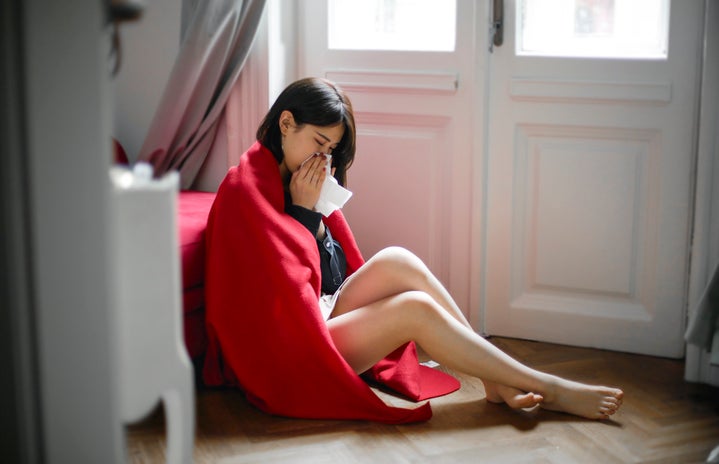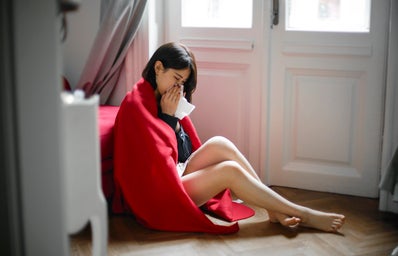After weeks of feeling overwhelmed and burnt out, I finally cracked at 10 p.m. on Father’s Day. I was lying in a hot bath letting the tears run down my face into the water, hugging my knees to my chest like a first grader does when they’re trying to comfort themselves.
It had been a long month — no, actually a long year for both the world and my personal life. Between a cross country move, leaving my first job and friends in Arizona, a global pandemic, and the murder of George Floyd and subsequent protests, the entire world seemed to be fracturing. Even so, that night I wasn’t exactly crying about something earth-shattering. I was having trouble falling asleep again, and the frustration had become insurmountable.
It wasn’t until I listened to Kumail Nanjiani and Emily V. Gordon’s podcast Staying In With Emily & Kumail, when the two hosts weekly asked one another “what weird thing made you cry this week?” that the truth of it began to dawn on me. Maybe I wasn’t alone in this catharsis. Perhaps this was my body’s natural response to the state of the world, desperately clinging to a sense of stability and mourning what had been lost in the process.
Gordon, whose story inspired the movie The Big Sick on Amazon Prime, offers an expansive repertoire of advice on the show on how best to navigate quarantine (because she has done it before) while respecting your emotions. Together, the two hosts lament the loss of their typical LA life in and their own trials in quarantine.
After hearing Gordon’s story and advice as a former therapist, I was inspired to consult professionals about just how productive crying can be. After all, no one taught an instructional course in college titled “How to Emotionally Handle a Pandemic and Tragedies” in a 101 freshmen seminar. Crying specifically feels like a tricky and controversial subject. For women, it’s still highly stigmatized and can be interpreted as a sign of personal or professional weakness.
So, what’s the best way to validate one’s feelings while reaching for the Kleenex, without allowing it to control your life? I spoke with two experts on the catharsis of tears, and here’s what they had to share.

Reframe the negative associations with crying.
This one was tough for me. How often have I seen other women — important established women — be minimized because of their tears or feelings? But Dr. Roseann Capanna-Hodge, a Licensed Professional Counselor, calls crying a cathartic emotional release. “Taking the time to cry and work through these uncomfortable feelings is not only a positive action that doesn’t let emotions and stressors pile up, it can also be quite healing,” she explains.
Alexandra Stockwell MD, relationship and intimacy expert and author of Uncompromising Intimacy, brings an emotional component to the definition of crying and calls it beautiful. “With tears, whether they are slow warm tears gently sliding down a cheek, or uncontrollable waterworks, or anything else, they allow feelings to pass through…they involve a kind of surrender to the experience…and afterwards, the emotions have moved through and it can feel quiet, like the peaceful moments after a rainstorm,” Stockwell notes.
When I think of crying as something natural and healing, I feel liberated from shame I usually associate with the act. I lose the instinct to suppress my own emotions so as not to seem “weak” or “less than.”
Find the reason and recognize what is going on around you.
The infantilization of grown-ass women, who are simply upset, can do more than promote misogynistic narratives — it can distract from what crying does and also why we’re doing it in the first place. The Mayo Clinic says that crying can be a symptom of underlying stress or loneliness and isolation. As Gordon indicates in her podcast, it can even be an indirect reaction to what’s going on in the world around us.
“With so much going on in the world, we are being bombarded with a lot of stressors right now and as we try to wade through without taking time to calm our minds and bodies, that stress may cause one to be emotionally reactive to more benign things in our environment,” Dr. Roseann says.
Control your emotions — don’t let them control you.
Normalizing and validating emotions is one thing but healing is another. How do we understand these emotions, but not allow them to take over our lives?
Dr. Roseann says that understanding your triggers and practicing mindfulness can lead to better mental health options. “Once you better understand what your triggers are, you can assess and proactively implement coping strategies or even seek out professional help from a licensed mental health counselor,” she explains.
Stockwell suggests embracing temporal feelings and perhaps reaching out for clinical support, if necessary. In her words: “When we develop a growing ability to be with our feelings, even when uncomfortable, it turns out not to be so scary after all.”
It’s not easy to cry, let alone let someone else witness such vulnerability. While the comforting words of professionals do offer me solace, the act itself is still very stigmatized in my own mind; I’ll still be up to my old habits of feigning strength even when the voice inside me wavers and hiding frustrated tears. But at the very least — I know that crying is normal and even healthy for my mind and body now.
The more we normalize a few tears, the easier this will get. Hopefully, we’ll come out emotionally stronger from it, together.



